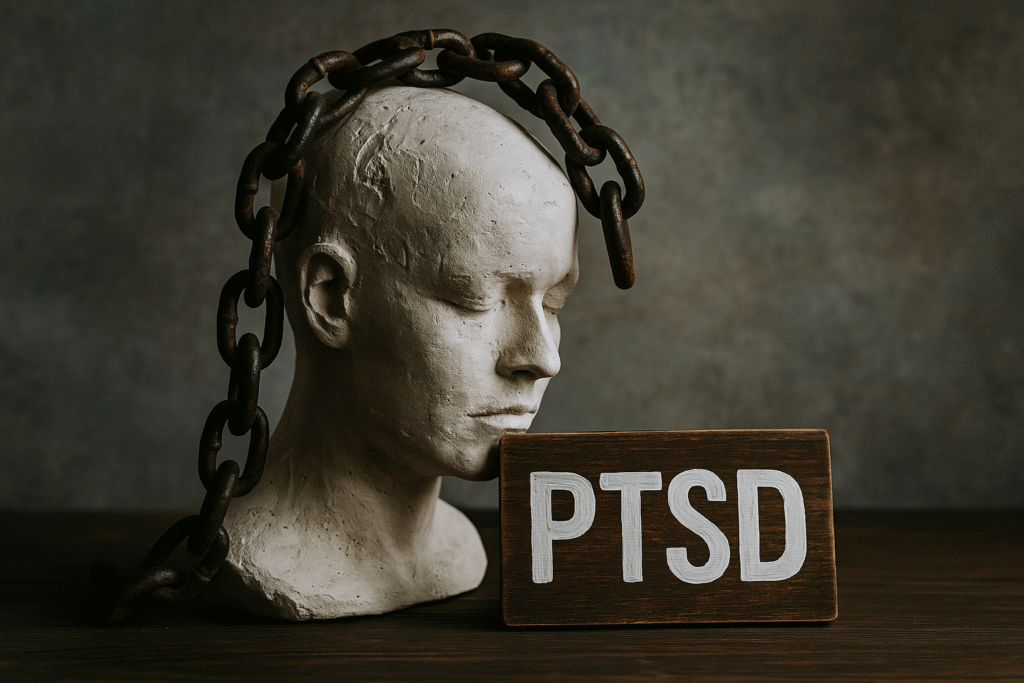In this edition of Hypnosis News I want to talk about our emotions affect reality, or our perception of it. Particularly in regards to trauma and PTSD. Few of us realize how important our internal dialogue is to our well being. So today I hope each of us will read this and take a few moments to see how their stinking thinking might be causing some damage in our lives.
We Live Hypnotically
Every day we go in and out of the hypnotic state. And just like a good hypnotist can bring us into a better state, bad hypnosis, even incidentally through our day, can take us into a bad state. If you’ve read our posts before, you know that hypnosis is a state of tightly narrowed focus of attention that increases our ability to learn and adapt.
This narrowed focus increases our ability to learn through what we call suggestibility. It’s a natural kind of learning regardless of how the state is induced. Though hypnotic states tend to be unconscious learning, though it doesn’t have to be. Meaning that we are often unaware of the learning or changes going on.
Conscious vs Unconscious Learning
We tend to learn things one of two ways. Either consciously, by constant repetition and struggle. Or unconsciously. In the case of unconscious learning, our mind absorbs information beyond what the conscious mind does and starts acting upon it when the situation arises. This is how you suddenly remember something you thought you’d forgotten from a class long ago. Or how you automatically know how to do something you didn’t realize you knew.
Bad Hypnosis: When Emotions Affect Reality
We all experience negative emotional states. Depression, anger, addiction, and fear are all hypnotic in a way. Each requires a narrowed focus in order to remain in our system down to the chemical level. They often exclude other aspects of reality that contradict what we’ll call a “symptomatic trance state”.
Think back to a time you got into a fight with your significant other. You get stuck until you walk and have time away from that feeling. In most cases, if you just sit there and continue to argue you remain stuck in that feeling. Because you’re hyper focused on it. As long as you’re focused on it, you’re body keeps feeding you the endorphins and natural chemicals to feed and maintain that feeling. That is what happens when emotions affect reality.
These strong emotional trance states make us more suggestible. In fact, they work almost exactly like therapeutic trance, only not relaxed or calm. In many cases a good hypnotist can see these conditioned states in our traumatized clients. And if we know what state we are looking to diffuse, we can pop that proverbial bubble fairly easily in therapeutic trance.
The Bad Suggestions We Take From Ourselves
We all generally know how phobias and fear begin. We encounter something that harms us and then we avoid that thing in the future. Only there is an additional emotional content that prevents us from seeing where a rational threat is. If you’re mugged by someone at night, you logically know that not all people are muggers at night. However, emotions don’t work with logic.
Emotionally, you may still have that fear of both going out at night and of other people mugging you. Emotions can override logic and lead to an incorrect assumption of belief. Which over time becomse a negative feedback loop that continues to conflate. Going back to the mugging example, say that someone was mugged on a bridge but left unharmed. Now, the next week, they try to cross a similar bridge. But before they know it they are having a similar pain response to the bridge even though they are safe and sound.
Now, reading this example we can clearly see how this post traumatic stress response is not a result of thinking. This is deep emotional conditioning. The narrowed attention the individual experienced during the attack delivered a hypnotic suggestion that bridges are dangerous. And they will continue to feel dangerous until that suggestion is dismantled either by some sort of intervention.
Trauma And Hypnotic Response
PTSD produces very real responses. So strong that the individual may relive the experience. Feeling, hearing, seeing, even smelling, everything that happened during the initial traumatizing event. Experiencing it as if it were happening in the present.
This wide awake dreaming is similar to something we see in stage hypnosis subjects. While mainstream psychology has not linked PTSD or phobias to the mechanism of pot hypnotic response, they likely will at some point in the future. We already see indications of this in the research. Some studies have found that people suffering from long term PTSD are also some of best hypnotic subjects. (1)
So how do we fix it?
Overcome Bad Conditioning With Good Hypnosis
One could look at this as a bad suggestions introduced by accidentally poor self hypnosis. If we think of it like this, then it could be potentially seen as a hypnotic disorder. Currently we tend to treat this with cognitive therapy. Essentially getting people to think differently.
However, this process tends to be time consuming, cumbersome, and ineffective. Likely because the problem is not how they are thinking. The person who crossed the bridge knows they are unlikely to be attacked again. However, they still respond with panic and fear. While long term cognitive therapy has been know to help, it may not be the best, or even the correct, tool for the job.
Are You Ready To Move Forward?
I’ve said it before and I’ll say it again hypnosis is a powerful tool. It is fast, safe, effective and life-changing. Whether we are dealing with PTSD or any other symptoms, it is likely that hypnosis can help in some way. Our deepest emotions can fundamentally change how we perceive things and later, how we react to them. Don’t let your emotions affect reality.
If you feel like your emotions are affecting your reality check out our site or call for more information. From All About Hypnosis to our services, we’re here to answer your questions and, where possible, help you find solutions.



